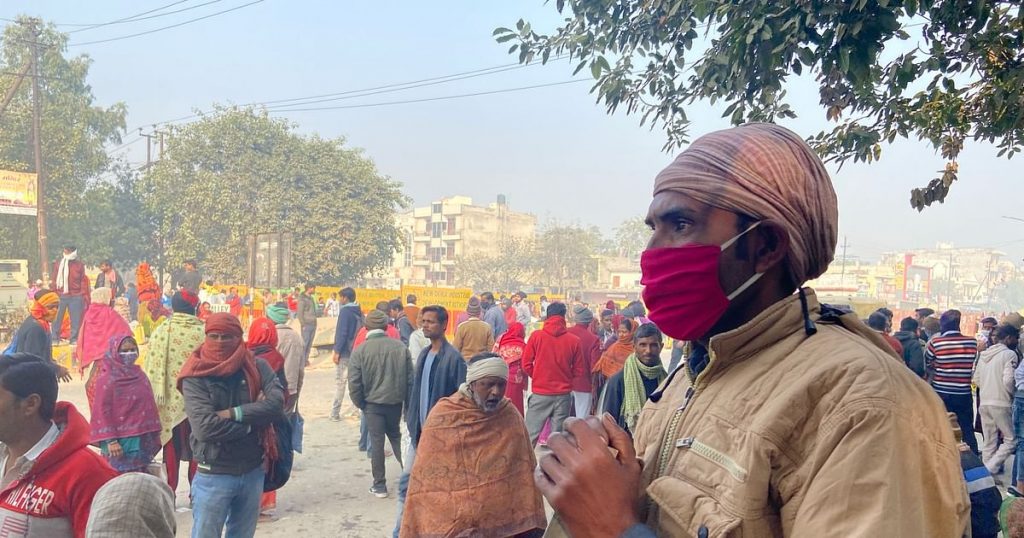It’s afternoon and hundreds of daily-wage earners are still sitting on the pavement or chatting in groups, hoping to get some work. But most of them will go back without any luck.
The last batch of three got picked up nearly four hours ago. The Sector 49 Labour Chowk, some 25 kilometres east of Delhi, witnesses this scene daily. “Only the number of people looking for work is rising,” Jitender Singh, a painter, said. “I didn’t get a single job in the last 10 days.”
The Covid-19 lockdown triggered the biggest migration since Partition out of Indian metros to the hinterland. Lack of work for everyone despite the record allocation to the rural jobs guarantee scheme forced them to return braving the virus, with reopening of the economy and vaccines providing hope.
But as the number of those seeking work at labour chowks, or unofficial employment hubs for unskilled workers, has surged, there are not enough odd jobs for housemaids and construction workers to rickshaw pullers. Factories, too, aren’t hiring like earlier as they want to curb costs with demand nowhere close to the pre-pandemic levels.
BloombergQuint spoke with some of them to find out what’s the situation:
No Work After Losing The First Steady Job She Had
Mamta Devi, 32, worked as an attendant in a private school, a job she got only last year before the pandemic. The pay was good, she said. Along with her daily-wage earning husband’s income, she said, “Sab kuch theek se chal raha tha (Everything was fine.)
Then the lockdown was announced. She lost her job as the school remained shut. Mamta returned to her village in Bihar along with her three kids and husband.
“We thought things will be back to normal in a few months. But that didn’t happen,” Mamta said. With no work and no other income, the couple returned in search of work, leaving the kids with their grandmother. “I came back thinking schools might reopen and there might be a job for me again.”
The couple has been frequenting the labour chowk for the three months. Her husband managed to find two to three days of work, but she hasn’t. “We are struggling to even arrange meals.”
Contracting the virus is the last thing she fears. “Virus is not for the poor,” she said. “All it has done was snatched us of our livelihood. There was a time when I used to wear a uniform to school. We have lost everything this year.”
In hope of finding work at labour chowk, Noida. (Source: Nishant Sharma/BloombergQuint)
Walked More Than 500 km, Only To Return
It’s been 14 days since Ashok Kumar, 36, last found work. “In the last five months, I have hardly had work for 20-25 days,” he said as he used his scarf as a face mask.
Kumar said he, along with wife and two children, walked more than 500 kilometres from Noida to his village in Hamirpur, Uttar Pradesh after the lockdown was announced. He couldn’t pay the rent without any job and feared his family would have to go without food.
He returned three months later as there was no work in his village either. They survived a Rs 50,000 loan against a small piece of land the family has and with the help of friends. But they have run out of money now.
It’s difficult to survive for 10-12 days on Rs 350 he makes for day’s work. And he will have to repay the loan soon. “I might even lose my land.”
In hope of finding work at labour chowk, Noida. (Source: Nishant Sharma/BloombergQuint)
Stayed During Lockdown But May Have To Leave Now
Pappu Patel, 23, stayed back when others left after the lockdown was announced. There was no work initially but he started getting odd jobs after May as restrictions were eased.
Then demand for workers rose and the pay was better amid a scarcity of labour, said Patel, who lives with his wife and two-year-old daughter in Noida. “I was able to earn Rs 500-700 a day during the pandemic, but now it has fallen by half,” he said. As more and more people returned, the situation has started to get worse, he said.
Now, there’s hardly any work. “If the situation persists like this, it looks like I might have to go back to my hometown in Bihar,” Patel said.
